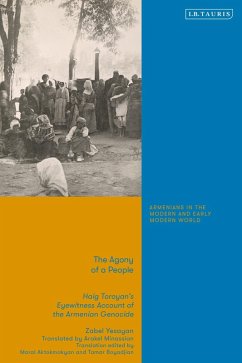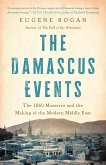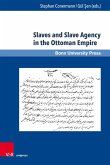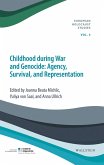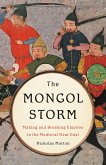Zabel YesayanHaig Toroyan's Eyewitness Account of the Armenian Genocide
The Agony of a People
Haig Toroyan's Eyewitness Account of the Armenian Genocide
Übersetzer: Minassian, Arakel
Zabel YesayanHaig Toroyan's Eyewitness Account of the Armenian Genocide
The Agony of a People
Haig Toroyan's Eyewitness Account of the Armenian Genocide
Übersetzer: Minassian, Arakel
- Gebundenes Buch
- Merkliste
- Auf die Merkliste
- Bewerten Bewerten
- Teilen
- Produkt teilen
- Produkterinnerung
- Produkterinnerung
"Haig Toroyan's account of his journey from Dikranagerd (Diyarbakir in modern-day southeastern Turkey) along the Euphrates River to Mesopotamia and Iran is a unique and hauntingly detailed account of the Armenian Genocide in 1915, translated into English for the first time"--
Andere Kunden interessierten sich auch für
![The Damascus Events The Damascus Events]() Eugene RoganThe Damascus Events29,99 €
Eugene RoganThe Damascus Events29,99 €![An Indigenous Peoples' History of the United States An Indigenous Peoples' History of the United States]() Roxanne Dunbar-OrtizAn Indigenous Peoples' History of the United States12,99 €
Roxanne Dunbar-OrtizAn Indigenous Peoples' History of the United States12,99 €![Slaves and Slave Agency in the Ottoman Empire Slaves and Slave Agency in the Ottoman Empire]() Slaves and Slave Agency in the Ottoman Empire70,00 €
Slaves and Slave Agency in the Ottoman Empire70,00 €![The Mother, the Politician, and the Guerrilla The Mother, the Politician, and the Guerrilla]() Nazan ÜstündagThe Mother, the Politician, and the Guerrilla25,99 €
Nazan ÜstündagThe Mother, the Politician, and the Guerrilla25,99 €![Childhood during War and Genocide Childhood during War and Genocide]() Childhood during War and Genocide30,00 €
Childhood during War and Genocide30,00 €![The Mongol Storm The Mongol Storm]() Nicholas MortonThe Mongol Storm30,99 €
Nicholas MortonThe Mongol Storm30,99 €![Röthenbach im Nationalsozialismus Röthenbach im Nationalsozialismus]() Leonhard HerbstRöthenbach im Nationalsozialismus24,80 €
Leonhard HerbstRöthenbach im Nationalsozialismus24,80 €-
-
-
"Haig Toroyan's account of his journey from Dikranagerd (Diyarbakir in modern-day southeastern Turkey) along the Euphrates River to Mesopotamia and Iran is a unique and hauntingly detailed account of the Armenian Genocide in 1915, translated into English for the first time"--
Hinweis: Dieser Artikel kann nur an eine deutsche Lieferadresse ausgeliefert werden.
Hinweis: Dieser Artikel kann nur an eine deutsche Lieferadresse ausgeliefert werden.
Produktdetails
- Produktdetails
- Verlag: Bloomsbury Publishing PLC
- Seitenzahl: 200
- Erscheinungstermin: 20. Februar 2025
- Englisch
- Abmessung: 234mm x 156mm
- Gewicht: 327g
- ISBN-13: 9780755654307
- ISBN-10: 0755654307
- Artikelnr.: 71846717
- Herstellerkennzeichnung
- Libri GmbH
- Europaallee 1
- 36244 Bad Hersfeld
- gpsr@libri.de
- Verlag: Bloomsbury Publishing PLC
- Seitenzahl: 200
- Erscheinungstermin: 20. Februar 2025
- Englisch
- Abmessung: 234mm x 156mm
- Gewicht: 327g
- ISBN-13: 9780755654307
- ISBN-10: 0755654307
- Artikelnr.: 71846717
- Herstellerkennzeichnung
- Libri GmbH
- Europaallee 1
- 36244 Bad Hersfeld
- gpsr@libri.de
Zabel Yesayan was a prominent Armenian writer and intellectual whose many novels and non-fiction works include In the Ruins, her account of the Adana massacres. Arakel Minassian is a PhD candidate at at the University of Michigan, USA
Translator's Preface
Editor's Preface and acknowledgements
Translating Hokevark or the Untranslatable Life-form by Maral Aktokmakyan,
PhD
Between the Lines: Haig Toroyan's Testimony and the Armenian Genocide Elyse
Semerdjian
Testimony and Authorship: Zabel Yesayan's The Agony of a People by Marc
Nichanian, translated by Tamar M. Boyadjian, PhD
Note on Transliteration
Introduction by Zabel Yesayan
Chapter 1: Dikranagerd, November 1914. Economic Boycott. The Burning of the
Bazaar. Military Requisitions and Mobilization.
Chapter 2: Jarabulus, December 1914 to November 12th, 1915. The Condition
of the Armenians Until February 1915. The First Signs of Enmity. The
Attempt to Massacre 2,000 Armenian Workers. The Incident of the Loggers.
Chapter 3: The Deportations in Cilicia: Zeytun, Dört-yol (Chork Marzvan).
Hajn. Aintab.
Chapter 4: The Story of a Wealthy Village. The Sight of the Arriving
Refugees. The Collapsed Woman. Nighttime Assaults. A Complaint to the
Turkish Authorities.
Chapter 5: An Armenian Mother. Children Are Sold Off. The Role of a Greek
Woman.
Chapter 6: The Distribution of Bread. The First Corpses on the Euphrates.
Seventy Children Drowned.
Chapter 7: Episodes from the Deportations of Armenians from Armenia.
Dikranagerd. Mardin. In Resulayn. In Tell Abyad. In Edessa Arap Pinar.
Chapter 8: The Plain of Suruç/Suruj Plain (Armenian cemetery). Jarabulus'
Bazaar. The Image of the Nizib khan.
Chapter 9: The Transportation of the Population by Train. Water. Water. A
Woman from Yerznga, and the Deportation of Yerznga. The Story of
Chemeshgadzak.
Chapter 10: The Deported Population on Foot Towards Aleppo. A Bride's
Escape. The passage of Seventy Armenians from Erzrum (the Deportation of
Erzrum).
Chapter 11: Groups of Armenians passing through Birecik. Murad, Murad, You
Have Fulfilled Our Wishes.
Chapter 12: Aleppo. Turkish and Armenian Committees for Settling the
Deportees. The Behaviour of Aleppo's Armenian Population. The Condition of
Aleppo's Armenian Population. A General Picture. The Passage of the
Armenian Intellectuals. Zohrab and Vartkes.
Chapter 13: The Edessa (Urfa) Resistance. The First Steps of Deportation.
The Armenians Are in Revolt. Negotiations. A Turkish Army Besieges the
Armenian Quarter. 15 Days of Fighting. Edessa Ruined. The Former Situation.
Chapter 14: A Wedding Among the Kurds. A Temporary Order Concerning the
Property of the Exiled Armenians. The Birecik Armenians Convert to Islam,
yet are Still Deported. The Words of a Turkish Soldier from Marash.
Chapter 15: The Turks' Suspicious Attitude Towards Me and the Other Local
Armenians. Jarabulus' 's The German Hospital at Jarabulus. Captain Otto
Oehlmann, a German Officer. My Departure.
Chapter 16: Meskene. The Teacher. Towards Raqqa
Chapter 17: Raqqa. The Armenian Cemetery. The Sight of the People Gone Mad
in the Field. The State of the Exiles on the Left Bank in Raqqa. The Burial
of a Girl.
Chapter 18: Towards Deir ez-Zor. Marash's Armenian Villagers. The Image of
the Population on the Banks of the Euphrates. A Second Meeting with a Group
of Armenian Exiles.
Chapter 19: Deir ez-Zor. Meeting with the Colonel. The Market. A Girl from
Mezere. Before the Pharmacy.
Chapter 20: Towards Aney. Aney. An Old Man Loses Consciousness. The Market.
Chapter 21: Towards Hadise. Hadise. The Price of Freeing an Armenian Girl.
Chapter 22: Hit. The Students of Aintab's Seminary. The Market. An Armenian
Girl is Requested from Baghdad.
Chapter 23: Ramadi. 300 Armenians from Zeytun in a cave. The Conduct of an
Arab Baker. Fallujah. The Story of a Wealthy Armenian Family.
Chapter 24: Baghdad. 49 Armenians Are Deported. The Gallows. The Armenians'
Situation. The German Consul's Resistance. The Words of Halil Pasha.
Chapter 25: Towards Persia. The Arabs Steal Two Trunks of Weapons. We Cross
the Border. The German Officer Takes to Illness. He Goes Mad. Towards
Kermanshah. The German Officer Commits Suicide. The Russians Capture
Kermanshah, and I go to the Caucasus
Editor's Preface and acknowledgements
Translating Hokevark or the Untranslatable Life-form by Maral Aktokmakyan,
PhD
Between the Lines: Haig Toroyan's Testimony and the Armenian Genocide Elyse
Semerdjian
Testimony and Authorship: Zabel Yesayan's The Agony of a People by Marc
Nichanian, translated by Tamar M. Boyadjian, PhD
Note on Transliteration
Introduction by Zabel Yesayan
Chapter 1: Dikranagerd, November 1914. Economic Boycott. The Burning of the
Bazaar. Military Requisitions and Mobilization.
Chapter 2: Jarabulus, December 1914 to November 12th, 1915. The Condition
of the Armenians Until February 1915. The First Signs of Enmity. The
Attempt to Massacre 2,000 Armenian Workers. The Incident of the Loggers.
Chapter 3: The Deportations in Cilicia: Zeytun, Dört-yol (Chork Marzvan).
Hajn. Aintab.
Chapter 4: The Story of a Wealthy Village. The Sight of the Arriving
Refugees. The Collapsed Woman. Nighttime Assaults. A Complaint to the
Turkish Authorities.
Chapter 5: An Armenian Mother. Children Are Sold Off. The Role of a Greek
Woman.
Chapter 6: The Distribution of Bread. The First Corpses on the Euphrates.
Seventy Children Drowned.
Chapter 7: Episodes from the Deportations of Armenians from Armenia.
Dikranagerd. Mardin. In Resulayn. In Tell Abyad. In Edessa Arap Pinar.
Chapter 8: The Plain of Suruç/Suruj Plain (Armenian cemetery). Jarabulus'
Bazaar. The Image of the Nizib khan.
Chapter 9: The Transportation of the Population by Train. Water. Water. A
Woman from Yerznga, and the Deportation of Yerznga. The Story of
Chemeshgadzak.
Chapter 10: The Deported Population on Foot Towards Aleppo. A Bride's
Escape. The passage of Seventy Armenians from Erzrum (the Deportation of
Erzrum).
Chapter 11: Groups of Armenians passing through Birecik. Murad, Murad, You
Have Fulfilled Our Wishes.
Chapter 12: Aleppo. Turkish and Armenian Committees for Settling the
Deportees. The Behaviour of Aleppo's Armenian Population. The Condition of
Aleppo's Armenian Population. A General Picture. The Passage of the
Armenian Intellectuals. Zohrab and Vartkes.
Chapter 13: The Edessa (Urfa) Resistance. The First Steps of Deportation.
The Armenians Are in Revolt. Negotiations. A Turkish Army Besieges the
Armenian Quarter. 15 Days of Fighting. Edessa Ruined. The Former Situation.
Chapter 14: A Wedding Among the Kurds. A Temporary Order Concerning the
Property of the Exiled Armenians. The Birecik Armenians Convert to Islam,
yet are Still Deported. The Words of a Turkish Soldier from Marash.
Chapter 15: The Turks' Suspicious Attitude Towards Me and the Other Local
Armenians. Jarabulus' 's The German Hospital at Jarabulus. Captain Otto
Oehlmann, a German Officer. My Departure.
Chapter 16: Meskene. The Teacher. Towards Raqqa
Chapter 17: Raqqa. The Armenian Cemetery. The Sight of the People Gone Mad
in the Field. The State of the Exiles on the Left Bank in Raqqa. The Burial
of a Girl.
Chapter 18: Towards Deir ez-Zor. Marash's Armenian Villagers. The Image of
the Population on the Banks of the Euphrates. A Second Meeting with a Group
of Armenian Exiles.
Chapter 19: Deir ez-Zor. Meeting with the Colonel. The Market. A Girl from
Mezere. Before the Pharmacy.
Chapter 20: Towards Aney. Aney. An Old Man Loses Consciousness. The Market.
Chapter 21: Towards Hadise. Hadise. The Price of Freeing an Armenian Girl.
Chapter 22: Hit. The Students of Aintab's Seminary. The Market. An Armenian
Girl is Requested from Baghdad.
Chapter 23: Ramadi. 300 Armenians from Zeytun in a cave. The Conduct of an
Arab Baker. Fallujah. The Story of a Wealthy Armenian Family.
Chapter 24: Baghdad. 49 Armenians Are Deported. The Gallows. The Armenians'
Situation. The German Consul's Resistance. The Words of Halil Pasha.
Chapter 25: Towards Persia. The Arabs Steal Two Trunks of Weapons. We Cross
the Border. The German Officer Takes to Illness. He Goes Mad. Towards
Kermanshah. The German Officer Commits Suicide. The Russians Capture
Kermanshah, and I go to the Caucasus
Translator's Preface
Editor's Preface and acknowledgements
Translating Hokevark or the Untranslatable Life-form by Maral Aktokmakyan,
PhD
Between the Lines: Haig Toroyan's Testimony and the Armenian Genocide Elyse
Semerdjian
Testimony and Authorship: Zabel Yesayan's The Agony of a People by Marc
Nichanian, translated by Tamar M. Boyadjian, PhD
Note on Transliteration
Introduction by Zabel Yesayan
Chapter 1: Dikranagerd, November 1914. Economic Boycott. The Burning of the
Bazaar. Military Requisitions and Mobilization.
Chapter 2: Jarabulus, December 1914 to November 12th, 1915. The Condition
of the Armenians Until February 1915. The First Signs of Enmity. The
Attempt to Massacre 2,000 Armenian Workers. The Incident of the Loggers.
Chapter 3: The Deportations in Cilicia: Zeytun, Dört-yol (Chork Marzvan).
Hajn. Aintab.
Chapter 4: The Story of a Wealthy Village. The Sight of the Arriving
Refugees. The Collapsed Woman. Nighttime Assaults. A Complaint to the
Turkish Authorities.
Chapter 5: An Armenian Mother. Children Are Sold Off. The Role of a Greek
Woman.
Chapter 6: The Distribution of Bread. The First Corpses on the Euphrates.
Seventy Children Drowned.
Chapter 7: Episodes from the Deportations of Armenians from Armenia.
Dikranagerd. Mardin. In Resulayn. In Tell Abyad. In Edessa Arap Pinar.
Chapter 8: The Plain of Suruç/Suruj Plain (Armenian cemetery). Jarabulus'
Bazaar. The Image of the Nizib khan.
Chapter 9: The Transportation of the Population by Train. Water. Water. A
Woman from Yerznga, and the Deportation of Yerznga. The Story of
Chemeshgadzak.
Chapter 10: The Deported Population on Foot Towards Aleppo. A Bride's
Escape. The passage of Seventy Armenians from Erzrum (the Deportation of
Erzrum).
Chapter 11: Groups of Armenians passing through Birecik. Murad, Murad, You
Have Fulfilled Our Wishes.
Chapter 12: Aleppo. Turkish and Armenian Committees for Settling the
Deportees. The Behaviour of Aleppo's Armenian Population. The Condition of
Aleppo's Armenian Population. A General Picture. The Passage of the
Armenian Intellectuals. Zohrab and Vartkes.
Chapter 13: The Edessa (Urfa) Resistance. The First Steps of Deportation.
The Armenians Are in Revolt. Negotiations. A Turkish Army Besieges the
Armenian Quarter. 15 Days of Fighting. Edessa Ruined. The Former Situation.
Chapter 14: A Wedding Among the Kurds. A Temporary Order Concerning the
Property of the Exiled Armenians. The Birecik Armenians Convert to Islam,
yet are Still Deported. The Words of a Turkish Soldier from Marash.
Chapter 15: The Turks' Suspicious Attitude Towards Me and the Other Local
Armenians. Jarabulus' 's The German Hospital at Jarabulus. Captain Otto
Oehlmann, a German Officer. My Departure.
Chapter 16: Meskene. The Teacher. Towards Raqqa
Chapter 17: Raqqa. The Armenian Cemetery. The Sight of the People Gone Mad
in the Field. The State of the Exiles on the Left Bank in Raqqa. The Burial
of a Girl.
Chapter 18: Towards Deir ez-Zor. Marash's Armenian Villagers. The Image of
the Population on the Banks of the Euphrates. A Second Meeting with a Group
of Armenian Exiles.
Chapter 19: Deir ez-Zor. Meeting with the Colonel. The Market. A Girl from
Mezere. Before the Pharmacy.
Chapter 20: Towards Aney. Aney. An Old Man Loses Consciousness. The Market.
Chapter 21: Towards Hadise. Hadise. The Price of Freeing an Armenian Girl.
Chapter 22: Hit. The Students of Aintab's Seminary. The Market. An Armenian
Girl is Requested from Baghdad.
Chapter 23: Ramadi. 300 Armenians from Zeytun in a cave. The Conduct of an
Arab Baker. Fallujah. The Story of a Wealthy Armenian Family.
Chapter 24: Baghdad. 49 Armenians Are Deported. The Gallows. The Armenians'
Situation. The German Consul's Resistance. The Words of Halil Pasha.
Chapter 25: Towards Persia. The Arabs Steal Two Trunks of Weapons. We Cross
the Border. The German Officer Takes to Illness. He Goes Mad. Towards
Kermanshah. The German Officer Commits Suicide. The Russians Capture
Kermanshah, and I go to the Caucasus
Editor's Preface and acknowledgements
Translating Hokevark or the Untranslatable Life-form by Maral Aktokmakyan,
PhD
Between the Lines: Haig Toroyan's Testimony and the Armenian Genocide Elyse
Semerdjian
Testimony and Authorship: Zabel Yesayan's The Agony of a People by Marc
Nichanian, translated by Tamar M. Boyadjian, PhD
Note on Transliteration
Introduction by Zabel Yesayan
Chapter 1: Dikranagerd, November 1914. Economic Boycott. The Burning of the
Bazaar. Military Requisitions and Mobilization.
Chapter 2: Jarabulus, December 1914 to November 12th, 1915. The Condition
of the Armenians Until February 1915. The First Signs of Enmity. The
Attempt to Massacre 2,000 Armenian Workers. The Incident of the Loggers.
Chapter 3: The Deportations in Cilicia: Zeytun, Dört-yol (Chork Marzvan).
Hajn. Aintab.
Chapter 4: The Story of a Wealthy Village. The Sight of the Arriving
Refugees. The Collapsed Woman. Nighttime Assaults. A Complaint to the
Turkish Authorities.
Chapter 5: An Armenian Mother. Children Are Sold Off. The Role of a Greek
Woman.
Chapter 6: The Distribution of Bread. The First Corpses on the Euphrates.
Seventy Children Drowned.
Chapter 7: Episodes from the Deportations of Armenians from Armenia.
Dikranagerd. Mardin. In Resulayn. In Tell Abyad. In Edessa Arap Pinar.
Chapter 8: The Plain of Suruç/Suruj Plain (Armenian cemetery). Jarabulus'
Bazaar. The Image of the Nizib khan.
Chapter 9: The Transportation of the Population by Train. Water. Water. A
Woman from Yerznga, and the Deportation of Yerznga. The Story of
Chemeshgadzak.
Chapter 10: The Deported Population on Foot Towards Aleppo. A Bride's
Escape. The passage of Seventy Armenians from Erzrum (the Deportation of
Erzrum).
Chapter 11: Groups of Armenians passing through Birecik. Murad, Murad, You
Have Fulfilled Our Wishes.
Chapter 12: Aleppo. Turkish and Armenian Committees for Settling the
Deportees. The Behaviour of Aleppo's Armenian Population. The Condition of
Aleppo's Armenian Population. A General Picture. The Passage of the
Armenian Intellectuals. Zohrab and Vartkes.
Chapter 13: The Edessa (Urfa) Resistance. The First Steps of Deportation.
The Armenians Are in Revolt. Negotiations. A Turkish Army Besieges the
Armenian Quarter. 15 Days of Fighting. Edessa Ruined. The Former Situation.
Chapter 14: A Wedding Among the Kurds. A Temporary Order Concerning the
Property of the Exiled Armenians. The Birecik Armenians Convert to Islam,
yet are Still Deported. The Words of a Turkish Soldier from Marash.
Chapter 15: The Turks' Suspicious Attitude Towards Me and the Other Local
Armenians. Jarabulus' 's The German Hospital at Jarabulus. Captain Otto
Oehlmann, a German Officer. My Departure.
Chapter 16: Meskene. The Teacher. Towards Raqqa
Chapter 17: Raqqa. The Armenian Cemetery. The Sight of the People Gone Mad
in the Field. The State of the Exiles on the Left Bank in Raqqa. The Burial
of a Girl.
Chapter 18: Towards Deir ez-Zor. Marash's Armenian Villagers. The Image of
the Population on the Banks of the Euphrates. A Second Meeting with a Group
of Armenian Exiles.
Chapter 19: Deir ez-Zor. Meeting with the Colonel. The Market. A Girl from
Mezere. Before the Pharmacy.
Chapter 20: Towards Aney. Aney. An Old Man Loses Consciousness. The Market.
Chapter 21: Towards Hadise. Hadise. The Price of Freeing an Armenian Girl.
Chapter 22: Hit. The Students of Aintab's Seminary. The Market. An Armenian
Girl is Requested from Baghdad.
Chapter 23: Ramadi. 300 Armenians from Zeytun in a cave. The Conduct of an
Arab Baker. Fallujah. The Story of a Wealthy Armenian Family.
Chapter 24: Baghdad. 49 Armenians Are Deported. The Gallows. The Armenians'
Situation. The German Consul's Resistance. The Words of Halil Pasha.
Chapter 25: Towards Persia. The Arabs Steal Two Trunks of Weapons. We Cross
the Border. The German Officer Takes to Illness. He Goes Mad. Towards
Kermanshah. The German Officer Commits Suicide. The Russians Capture
Kermanshah, and I go to the Caucasus

